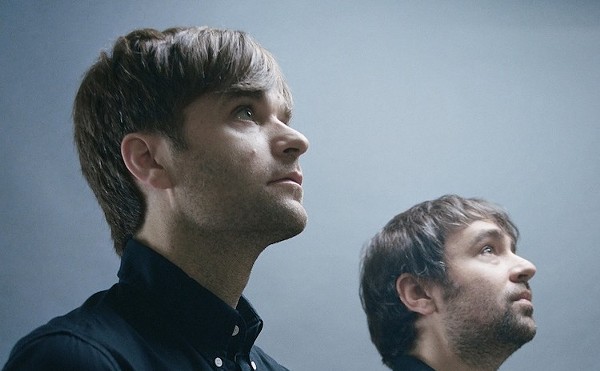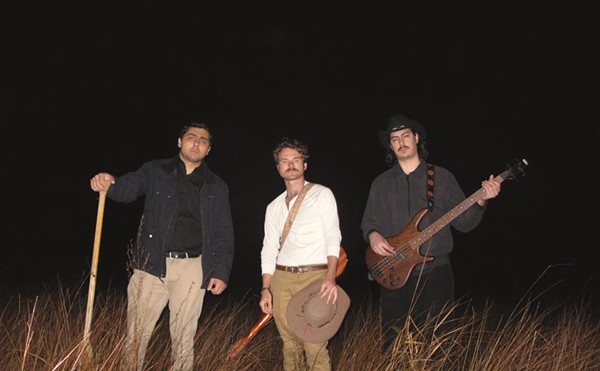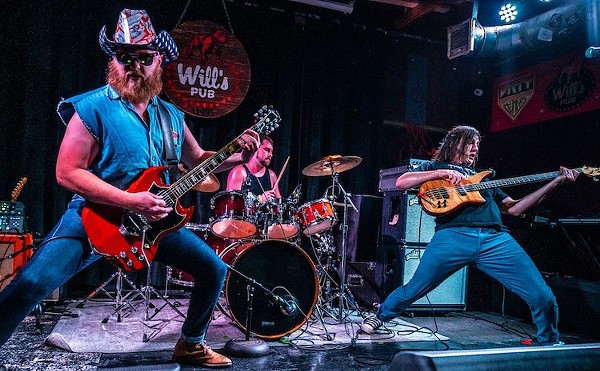While Robert Pollard may look more like your old guidance counselor than a rock star, he is the singer, songwriter and spiritual leader of the most high-octane rock & roll band on the planet, Dayton, Ohio's Guided by Voices. For more than 20 years, Pollard has been cranking out three-minute verse-chorus-verse songs by the hundreds, all characterized by simple, loud, hard-hitting chord progressions and catchy, powerful lyrics. Pollard's singing has drawn comparisons to the Beatles, Cheap Trick and just about any '80s progressive rocker you can think of. There's no choreography to Guided by Voices. No pyrotechnics. No DJ scratching records. No experimental departures. No Satan. There's not even a cool haircut in the band. Just a lot of songs, a lot of beer and some really high leg kicks.
Ironically, the fact that Robert Pollard didn't break out of the garage until the ripe old age of 36 might actually be a good thing. In many ways, at 43 he's just getting started. And truth be told, the music world needs him now more than ever. Go ahead. See for yourself. Watch an hour of MTV. Take a trip to the record store. You'll find boy bands like 'N Sync crooning pre-pubescently, costumed like extras from "Star Trek II." There's Eminem, using his "flow" to diss teen-age lip-syncing vamps Britney Spears and Christina Aguilera. Of course, the three acts sit so closely to one another atop the pop charts that their only real differences are a sports bra and the use of the word motherfucker. And then, of course, we have the rockers Metallica, whose drummer Lars Ulrich chose to personally rat-out 300,000 of the band's fans as copyright pirates this summer for downloading or, um, "stealing" his songs over the popular music-share software Napster.
Are you wondering what's happened to good old rock & roll? Wondering where the band is that can still send a chill down your spine, leave you singing a catchy verse or playing air guitar -- the band that won't sue you for copyright infringement? Well, worry not. They've quit their day jobs. And Guided by Voices is coming soon to a bar near you.
"The band was just totally for fun," says Pollard, recalling his unlikely late-life transformation from middle-class respectability to rock & roll hero. It's early on a Monday morning, and Pollard is in a good mood, eager to talk about his life and music. "When we first started making music, my only ambition, and this is the truth, was for us maybe to appear 20 years later on some kind of compilation. That would've been it for me. Obviously, we got a little higher than that."
; ;For 14 years, Robert Pollard's "real life" job was as an elementary-school teacher in the Dayton public school system. But all along he was writing and recording songs with his buddies, mostly as an excuse to drink beer, get loud and have fun. "The thing is, we never even tried to make it," Pollard recalls. "We were basically just a rock band with no money. We never tried to sell ourselves at all."
; ;And then it happened. After a three-piece band from Seattle named Nirvana, led by talented songwriter and tortured frontman Kurt Cobain, tried not to sell themselves, they instead sold 7 million records and sparked a garage-band renaissance, dubbed the alternative movement, or "Lo-Fi," for low fidelity.
"Suddenly we kind of had a category to be placed into," Pollard says of the early '90s. "That whole Lo-Fi thing started, and because we had been doing it for longer than those bands, we were kind of thrust to the top, as being the pioneers of it." Overnight, Pollard became, literally, too cool for school.
But after 14 years in the fourth grade -- about 13 years longer than most careers in rock & roll -- and pushing 40 -- the age when most rockers enter rehab, go bankrupt, look stupid in leather pants and ultimately wind up a subject for VH1's Behind the Music -- could the teacher called "Mr. Rocker," married and with two children of his own, really just walk away from the blackboard to pursue a "Lo-Fi" rock & roll dream? Pollard says the choice was scary but not difficult.
"You can talk about that kind of decision with people, but they don't understand," recalls Pollard, of the decision to pursue music full time. "When you've been working, teaching for 14 years, and then you lay on your fellow teachers and your family, your mom and dad, that I'm going to quit and go into music -- people didn't even attempt to understand that I would throw away a 14-year teaching career with benefits and everything."
Pollard admits that he never thought he could make a living as a musician. "I never really had any true ambition to do it," he says. "But I always wanted to. Everybody wants to be a rocker. It's the best job. It's decadent and fun."
Decadent and fun sums up Guided by Voices perfectly. In stark contrast to the scripted, click track, lip-synced arena shows of today, Guided by Voices is a throwback to the good old days of rock. The band is infamous for its blistering, raucous and alcohol-fueled stage shows. It's all part of the quintessential rock & roll experience that legions of loyal Guided by Voices fans have come to expect from the band.
On stage, Pollard plays the part of rock & roll god with relish, constantly chugging beer, smoking, singing in a Brit-pop accent and pulling off classic leg kicks like an NFL punter. He spews humorous observations and rock clichés effortlessly between songs, while the band huddles to light cigarettes or swig from a whiskey bottle. And the band almost always plays until they are no longer physically able to continue, either from exhaustion or intoxication. Six or seven encores are almost automatic. If you do the rock calculus on style points alone, Guided by Voices just might be the greatest American rock band. Ever.
"When we first broke out and we had to start playing shows where people were showing up chanting, ‘G-B-V, G-B-V,' I was petrified," says Pollard, explaining the origin of his onstage drinking. "It definitely takes the edge off to have a few beers." Pollard says he tries not to cross the line to where the shows get sloppy. But that's just a flat-out lie. The man likes to drink beer and play rock & roll. If the band's having a good time, everyone has a good time. And Pollard knows it.
"Bob's little trick is that he says when it looks like he's chugging beer onstage that most of it's spilling out of his mouth," says Jim Greer, who played bass for Guided by Voices from 1994 to '96. "But having said that, he still goes through quite a bit of beer. There are five cases of beer on the rider and one bottle of Jack Daniels. And it's gone by the end. It didn't drink itself, I know that much."
More famous for his role as a music journalist with Spin magazine in the '90s, where he penned the memorable "A Year in the Life of Rock and Roll" series, Greer now works in Los Angeles as a screenwriter but remains close to Pollard. "It was fun, always fun," he recalls of his days touring with Pollard and Guided by Voices. "Most of the time when we were touring, everyone's getting drunk, and we're just having a really good time, and that's the whole point of it," he says.
Of course, that's most of the time. There's also the time Pollard was tossed from an Austin, Texas, punk-rock club for heckling an opening band. And there's that night in Toronto, when the band was opening for Chicago's Urge Overkill. Opening is something the band never likes to do and rarely does. Prohibited from performing encores by the Urge Overkill crew, tensions were already running high that night. But when Pollard returned to the stage after a typically hot set to acknowledge the crowd's ritual chants of "G-B-V, G-B-V," the Urge Overkill crew apparently took exception. There was some pushing and shoving. "You just don't push Bob," says Greer. "You just don't. It's just not a good idea." It took about five members of security to subdue Pollard, and the band left the tour a few shows later. Urge Overkill broke up shortly thereafter.
"I don't think I drink on tour as much as I used to," says Pollard in his defense. "I used to start drinking sometimes at noon, and by the time we played, I'd be completely trashed. Now I start drinking a couple of beers a few hours before the show. Except for some of these hometown shows."
Oh yes, the hometown shows. They say the hometown shows are always the toughest. And as a former teacher and pillar of the Dayton community, they can be particularly tough for Pollard. "When I play a hometown show, if I'm a little too drunk, they'll really assassinate me in the paper," Pollard says, pointing to the band's latest hometown gig, a benefit performance. After partying with friends for three hours and then playing for another three, Pollard says he was stumbling drunk and exhausted. "A couple of times I fell into the drums," he recalls. A few days later, the local music columnist tore him apart.
"He was comparing me to like Jimi Hendrix and Janis Joplin, saying this was a tragedy in the making. My parents and other people, like the older ladies I used to teach with, they got all concerned -- is Bobby OK? Is that really happening to him? I mean, it'd be different if I came out in the first half-hour and I was like that. But this was after six hours of drinking and playing. I would think that would be heroic to someone who's into rock & roll."
; ;Despite Pollard's local critics, to those who are into rock & roll, make no mistake, Pollard is a rock hero. And he intends to stick around for a while. "At first, people would say this may not last very long. This may last a year and you're done. Well, it's still going pretty strong," he says.
; ;Ultimately, Pollard's maturity at the time of his success has served him well. At a point when many young bands get sucked into the rock & roll machine, becoming beholden to large record companies, bargaining away their artistic freedom and touring with large, cash-draining entourages, Pollard chose a simpler, if less glamorous route, signing first with Matador, the renowned independent label, over music giant Warner Bros. "That was a conscious decision on my part," says Pollard. "It was Warner Bros. and Matador for like eight months. It took me eight months to make a decision because Warner Bros. was being really, really nice to us. But I also kind of saw through it. I didn't know if I was ready to go from complete obscurity right to the major labels. I thought we might get lost in the shuffle."
; ;It's a timeless rock & roll tale, says Greer. On one side of the table sit the greedy record companies and on the other side the starving artists. But artists, he notes, ultimately make the choice.
; ;"You can't put all the blame on record companies," says Greer. "There's enough history there to know what's going to happen if you sign to a major label, and there are ways to do it without being destroyed. If you're not intending to make a record that is going to sell well, you're going to get dropped. And if you take all this money as an advance, you're gonna have to pay it back. Bob was smart enough not to do that."
; ;By forsaking the quick strike, Pollard has survived a '90s alternative gold rush that saw a number of promising bands destroyed. And by remaining true to their rock roots, the band has developed a large, loyal fan following. They've also been able to make music at an astonishing rate. Pollard is probably the most prolific songwriter in modern rock, with his combined solo/Guided by Voices catalog numbering more than 600 tracks.
; ;In October, Pollard headed back into the studio to record "Isolation Drills" (due in April), the follow-up to Guided by Voices' first major-label release, 1999's "Do the Collapse." Produced by the Cars' Ric Ocasek, Do the Collapse was the band's slickest, cleanest-sounding record to date and helped showcase Pollard's powerful pop vocals and signature hooks. The singles from the record, "Teenage FBI," "Hold on Hope" and "Surgical Focus" earned considerable airplay on the radio. And the band even played on network TV on Late Night With Conan O'Brien, prompting the music media to suggest the band was ready to break into the mainstream. Pollard isn't so sure.
"We're trying to shed that indie rock tag," he says. "But I guess it's a good tag to have, with what mainstream music is like. Our thing is just to do what we do -- play rock in a purist sense. Hopefully, something will happen where rock kind of comes back again."
It was logical to assume that after recording their second major-label release, Guided by Voices would pile into their limo and catch their private jet for a whirlwind tour of America's greatest arenas to introduce the already-heralded music. "Yeah, right," says Pollard. "What, no private rock jet?" I ask. "No jet," he says. "We're not as big as Ween yet."
This story was reprinted courtesy of Gadfly Magazine.
















